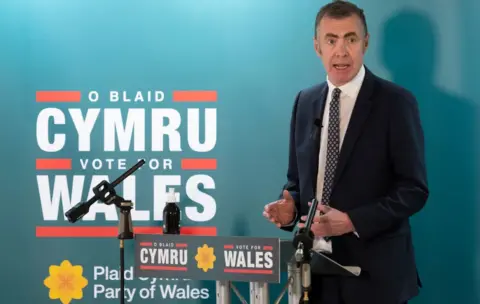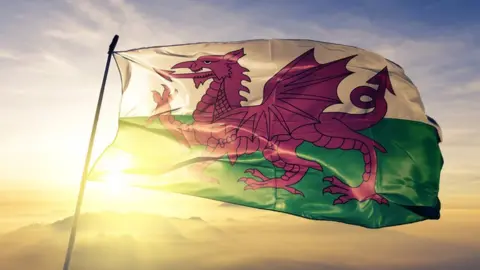Welsh election: Plaid promises independence vote in five years
 Getty Images
Getty ImagesPlaid Cymru would hold an independence referendum within five years if it came to power in May's Senedd election.
Launching its manifesto, the party said it offered the "most radical programme" in "any Welsh election since 1945".
Its plans include creating 60,000 green jobs, extending free school meals and social care free at the point of need.
Economists cost checking the promises called them "achievable" but could not say if "the spending is adequate to achieve the desired results".
Launching the manifesto, in Cardiff Bay, Plaid leader Adam Price said the "practical, deliverable and fully costed policies" would lead to a "fairer, greener, and more prosperous future for Wales".
Mr Price said his party would deliver a referendum within the next Senedd term if it was in government after 6 May.
"We believe independence to be the only sure and sustainable means to achieving social and economic progress," he said.
"So, a Plaid Cymru government will empower the people of Wales to decide the future of our nation in an independence referendum."
He added: "Wales has incredible potential as a nation. The problems that we have had for generations are not inevitable.
"We can solve these problems, together. But the first step is electing a new government that has the ambition to build a new Wales that's better than the old."
 Oleksii Liskonih/Getty Images
Oleksii Liskonih/Getty ImagesMr Price told BBC Radio Wales Breakfast with Claire Summers that Wales needed new leadership after years of Welsh Labour-led governments.
He said: "I'm not prepared to accept defeat. The only way that we're going to put Wales on a different path is if we change the political leadership of Wales and have a government that has the vision and ambition for Wales that has sadly been lacking in the last two decades."
He said the "central question" for Wales is how to put the country on a "different" economic trajectory. He confirmed that if he was the next first minister, he would also take on the role of economy minister.
"For too long we have been under-delivering in terms of quality jobs and decent wages for our communities and that is the central task of the next government of Wales," he said.
The manifesto's five main policies areas are:
- a Welsh Green Deal creating up to 60,000 new jobs; a youth jobs guarantee for 16 to 24-year-olds; zero interest loans to support small businesses to bounce back from the Covid pandemic and the creation of Prosperity Wales (an economic delivery agency)
- extending free school meals to all primary pupils; investing in 4,500 extra teachers and support staff, and providing free childcare from 24 months
- cutting average council tax bills; introducing a weekly child payment rising to £35 a week, and delivering 50,000 social and affordable homes
- providing social care free at the point of need; training and recruiting an extra 1,000 doctors and 5,000 nurses and allied health professionals and guaranteeing a £10 an hour minimum wage for care workers
- establishing an energy development company, Ynni Cymru, so that 100% of electricity in Wales comes from renewables by 2035, and introducing a Nature Act with statutory targets to restore biodiversity by 2050
The pledges include a promise to spend £6bn on a "green economic stimulus" to help create 60,000 new jobs, including £4bn on infrastructure.
Other pledges include helping Wales take part in Eurovision, and working towards a country "transformed" with racism eradicated by 2030.
Read more on the key points from the manifesto here.

Analysis by David Deans, BBC Wales political reporter
Plaid's manifesto is a hefty document, running to 126 pages, and is full of lofty pledges.
It says it wants to "transform" Wales by 2030 with a long table of possible improvements to the country's economy and society.
The document aims to set out a positive vision for Wales' future, and at its heart is significant constitutional change, pulling Wales out of the UK.
But that would need the UK government to come to agreement on a referendum, and for Plaid to win a majority.
The latter is something no party has ever done, outright, in the Senedd. If it was able to put the manifesto into practice, Plaid might have to pick and choose what to run with.
So its handy for any future negotiations with other parties that Plaid's shopping list has a lot of options to choose from.

The party says its "fully costed" manifesto pledges had been "independently verified by two of Wales' leading economists".
According to Prof Brian Morgan and Prof Gerry Holtham, the party says it would borrow £4bn to support its £6bn economic stimulus.
They concluded that Plaid's current spending commitments "seem achievable".
But they go on to say that the "areas of greatest uncertainty surround the borrowing target and the estimates of efficiency savings".

WALES ELECTION: THE BASICS
What elections are happening? On 6 May, people across Wales will vote to elect 60 Members of the Senedd (MSs). The party or parties that can command the support of a majority of members will form the Welsh government. Find out more here.
What powers does the Welsh Parliament have? MSs pass laws on many aspects of day-to-day life in Wales, such as health, education and transport. They also have control over some taxes. Defence, foreign policy and immigration are decided by the UK Parliament.
How do I vote? Anyone who lives in Wales and is registered to vote is eligible, so long as they are aged 16 or over on the day of the election. You can register to vote online.

The authors say Plaid Cymru's proposed efficiency savings of 1% per year - aimed at helping to fund some of the manifesto promises - "have not been specified in any detail".
On the party's infrastructure proposals, the economists warn most borrowing would have to be through "private finance" which would be costly and take more time.
"We remain doubtful that the proposed borrowing programme could be completed within a single term of the Senedd," they say.
They also note that the assumptions around the block grant, the sum of money received from the UK Treasury providing the majority of Welsh government funds, is "optimistic" but "not unreasonable," with the savings target "challenging" but "not impossible".
Some manifesto promises, they note, also depend on specific UK government decisions that "cannot be taken for granted".
The document does not cost the independence referendum proposals.

- BASICS: Simple guide to the Senedd election
- POLICY GUIDE: Who should I vote for?
- FIRST TIME: Will 16-year-olds vote?

